Rohinton Mistry - Tales From Firozsha Baag
Здесь есть возможность читать онлайн «Rohinton Mistry - Tales From Firozsha Baag» весь текст электронной книги совершенно бесплатно (целиком полную версию без сокращений). В некоторых случаях можно слушать аудио, скачать через торрент в формате fb2 и присутствует краткое содержание. Год выпуска: 2006, Издательство: Faber & Faber, Жанр: Современная проза, на английском языке. Описание произведения, (предисловие) а так же отзывы посетителей доступны на портале библиотеки ЛибКат.
- Название:Tales From Firozsha Baag
- Автор:
- Издательство:Faber & Faber
- Жанр:
- Год:2006
- ISBN:нет данных
- Рейтинг книги:3 / 5. Голосов: 1
-
Избранное:Добавить в избранное
- Отзывы:
-
Ваша оценка:
- 60
- 1
- 2
- 3
- 4
- 5
Tales From Firozsha Baag: краткое содержание, описание и аннотация
Предлагаем к чтению аннотацию, описание, краткое содержание или предисловие (зависит от того, что написал сам автор книги «Tales From Firozsha Baag»). Если вы не нашли необходимую информацию о книге — напишите в комментариях, мы постараемся отыскать её.
Tales From Firozsha Baag — читать онлайн бесплатно полную книгу (весь текст) целиком
Ниже представлен текст книги, разбитый по страницам. Система сохранения места последней прочитанной страницы, позволяет с удобством читать онлайн бесплатно книгу «Tales From Firozsha Baag», без необходимости каждый раз заново искать на чём Вы остановились. Поставьте закладку, и сможете в любой момент перейти на страницу, на которой закончили чтение.
Интервал:
Закладка:
But Kersi had wanted to play serious cricket ever since primary school. In the fifth standard he was finally chosen for the class team. On the eve of the match, however, the captain contracted mumps, and the vice-captain took over, promptly relegating Kersi to the extras and moving up his own crony. That was the end of serious cricket for Kersi. For a short while, his father used to take him and his Firozsha Baag friends to play at the Marine Drive maidaan on Sunday mornings. And nowadays, they played a little in the compound. But it was not the same. Besides, they were interrupted all the time by people like that mean old Rustomji in A Block. Of all the neighbours who yelled and scolded, Rustomji-the-curmudgeon did the loudest and the most. He always threatened to confiscate their bat and ball if they didn’t stop immediately.
Kersi now used his bat mainly for killing rats. Rat poison and a variety of traps were also employed with unflagging vigilance. But most of the rat population, with some rodent sixth sense, circumnavigated the traps. Kersi’s bat remained indispensable.
His mother was quite proud of his skill, and once she had bragged about it to Najamai upstairs: “So young, and yet so brave, the way he runs after the ugly things. And he never misses.” This was a mistake, because Kersi was promptly summoned the next time Najamai spied a rat in her flat. It had fled into the daughters’ room and Kersi rushed in after it. Vera had just finished her bath and was not dressed. She screamed, first when she saw the rat, and again, when Kersi entered after it. He found it hard to keep his eyes on the rat — it escaped easily. Soon after, Vera had gone abroad for higher studies, following her sister Dolly’s example.
The first time that Kersi successfully used his bat against a rat, it had been quite messy. Perhaps it was the thrill of the chase, or his rage against the invader, or just an ignorance about the fragility of that creature of fur and bone. The bat had come down with such vehemence that the rat was badly squashed. A dark red stain had oozed across the floor, almost making him sick. He discovered how sticky that red smear was only when he tried to wipe it off with an old newspaper.
The beef was now ready for the freezer. With seven packets of meat, and Najamai’s latchkeys in his pocket, Kersi plodded upstairs.
When Najamai’s daughters had gone abroad, they took with them the youthful sensuality that once filled the flat, and which could drive Kersi giddy with excitement on a day like this, with no one home, and all before him the prospect of exploring Vera and Dolly’s bedroom, examining their undies that invariably lay scattered around, running his hands through lacy frilly things, rubbing himself with these and, on one occasion, barely rescuing them from a sticky end. Now, exploration would yield nothing but Najamai’s huge underclothes. Kersi could not think of them as bras and panties — their vastness forfeited the right to these dainty names.
Feeling sadness, loss, betrayal, he descended the stairs lifelessly. Each wooden step, with the passage of years and the weight of tenants, was worn to concavity, and he felt just as worn. Not so long ago, he was able to counter spells of low spirits and gloominess by turning to his Enid Blyton books. A few minutes was all it took before he was sharing the adventures of the Famous Five or the Secret Seven, an idyllic existence in a small English village, where he would play with dogs, ride horses in the meadows, climb hills, hike through the countryside, or, if the season was right, build a snowman and have a snowball fight.
But lately, this had refused to work, and he got rid of the books. Percy had made fun of him for clinging to such silly and childish fantasy, inviting him to share, instead, the experience of aerial warfare with Biggies and his men in the RAF.
Everything in Firozsha Baag was so dull since Pesi paadmaroo had been sent away to boarding school. And all because of that sissy Jehangir, the Bulsara Bookworm.
Francis was back in the hallway, and was disappointed when Kersi did not notice him. Kersi usually stopped to chat; he got on well with all the servants in the building, especially Francis. Kersi’s father had taught him to play cricket but Francis had instructed him in kite-flying. With a kite and string bought with fifty paise earned for carrying Najamai’s quota of rice and sugar from the rationing depot, and with the air of a mentor, he had taught Kersi everything he knew about kites.
But the time they spent together was anathema to Kersi’s parents. They looked distastefully on the growing friendship, and all the neighbours agreed it was not proper for a Parsi boy to consort in this way with a man who was really no better than a homeless beggar, who would starve were it not for their thoughtfulness in providing him with odd jobs. No good would come of it, they said.
Much to their chagrin, however, when the kite-flying season of high winds had passed, Kersi and Francis started spinning tops and shooting marbles. These, too, were activities considered inappropriate for a Parsi boy.
At six-thirty, Tehmina went to Najamai’s flat for ice. This was the hour of the most precious of all ice-cubes — she’d just poured herself two fingers of Scotch.
A red glow from the Ambica Saris neon display outside Firozsha Baag floated eerily over the compound wall. Though the street lamps had now come on, they hardly illuminated the hallway, and tonight’s full moon was no help either. Tehmina cursed the locks eluding her efforts. But as she continued the unequal struggle by twilight, her armpits soaked with sweat, she admitted that life before the fridge had been even tougher.
In those days she had to venture beyond the compound of Firozsha Baag and buy ice from the Irani Restaurant in Tar Gully. It was not the money she minded but the tedium of it all. Besides, the residents of Tar Gully amused themselves by spitting from their tenement windows on all comers who were better-heeled than they. In impoverished Tar Gully she was certainly considered better-heeled, and many well-aimed globs had found their mark. On such evenings Tehmina, in tears, would return to her flat and rush to take a bath, cursing those satanic animals and fiends of Tar Gully. Meanwhile, the ice she had purchased would sit melting to a sliver.
As the door finally unlocked, Tehmina spied a figure at the far end of the darkened hallway. Heart racing a little, she wondered who it might be, and called out as authoritatively as she could, “Kaun hat? What do you want?”
The answer came: “Bai , it’s only Francis.”
The familiar voice gave her courage. She prepared to scold him. “Did I not tell you this morning not to loiter here? Did I not say we would call if there was work? Did I not tell you that Najamai would be very late? Tell me then, you rascal, what are you doing here?”
Francis was hungry. He had not eaten for two whole days, and had been hoping to earn something for dinner tonight. Unable to tolerate Tehmina much longer, he replied sullenly, “I came to see if Najamai had arrived,” and turned to go.
But Tehmina suddenly changed her mind. “Wait here while I get my ice,” she said, realizing that she could use his help to lock the door.
Inside, she decided it was best not to push Francis too far. One never knew when this type of person would turn vicious. If he wanted to, he could knock her down right now, ransack Najamai’s flat and disappear completely. She shuddered at these thoughts, then composed herself.
From downstairs came the strains of “The Blue Danube.” Tehmina swayed absently. Strauss! The music reminded her of a time when the world was a simpler, better place to live in, when trips to Tar Gully did not involve the risk of spit globs. She reached into the freezer, and “The Blue Danube” concluded. Grudgingly, Tehmina allowed that there was one thing about the Boyces: they had good taste in music. Those senseless and monotonous Hindi film-songs never blared from their flat as they did sometimes from the other blocks of Firozsha Baag.
Читать дальшеИнтервал:
Закладка:
Похожие книги на «Tales From Firozsha Baag»
Представляем Вашему вниманию похожие книги на «Tales From Firozsha Baag» списком для выбора. Мы отобрали схожую по названию и смыслу литературу в надежде предоставить читателям больше вариантов отыскать новые, интересные, ещё непрочитанные произведения.
Обсуждение, отзывы о книге «Tales From Firozsha Baag» и просто собственные мнения читателей. Оставьте ваши комментарии, напишите, что Вы думаете о произведении, его смысле или главных героях. Укажите что конкретно понравилось, а что нет, и почему Вы так считаете.












